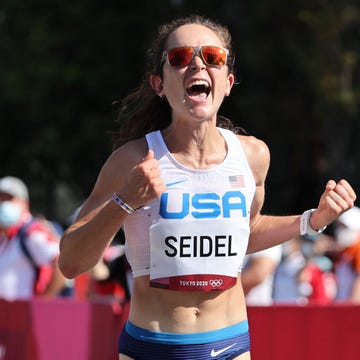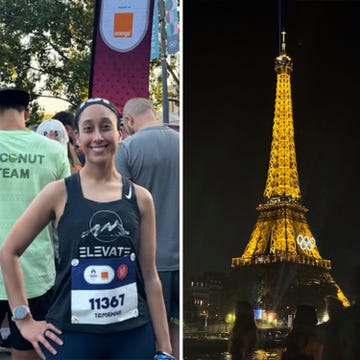What It Was Like to Run Marathon Pour Tous, Conner Mantz and Clayton Young had impressive races at the Olympic Marathon on Saturday in Paris.
Mantz finished in eighth place in 2:08:12, and Young was one spot behind in ninth in 2:08:44. Leonard Korir, the third American in the field, ran 2:18:45 for 63rd place.
The course was hilly and the weather was hot, but Mantz and Young ran fearlessly, mixing it up with the lead pack for the first 17 miles, before Tamirat Tola, the race’s winner, broke the field apart with a hard move up the steepest hill of the course. The two training partners high-fived right before the grueling hill.
Mantz ultimately finished 1:46 off the lead, and Young was 2:18 back from Tola’s Olympic record time of 2:06:26.
And although they were pleased to be in the top 10, both said they wanted more. They had hoped for medals.
Mantz decided to go with Tola through the first big hill on the course, at mile 9. “When Tola went, I was like, ‘That’s the guy. That’s the guy to go with,’” Mantz said, but he ultimately wondered if he covered Tola’s first move too closely and should have waited for the second move later in the race.
Young hung back a little bit, but he was able to rejoin the lead pack before the second large hill, at 17 miles. He let the pack get ahead of him again on that climb, but when the course flattened out over the final 10K, he found himself with more energy than he thought he’d have that late in the race.
“I was surprised how good I felt with 4K to go, and I started moving well, and I just left too much in the tank, to be honest,” he said. Both Mantz and Young ran negative splits (1:04:52 and 1:03:20 for Mantz; 1:04:59 and 1:03:45 for Young).
How to Cross-Train Your Way Into a Goal Race.
“Man, the crowds were wild,” Young said. “It was deafening the entire course. And, you know, you just gotta soak in that energy but almost ignore it. Because you can get too hyped, too soon. I kept telling myself to relax, relax, just because the crowds were deafening. It was super exciting, though.”
Mantz and Young, who both attended Brigham Young University and are coached by two-time Olympic marathoner Ed Eyestone, train together in Provo, Utah. The duo took the top two spots at February’s Olympians Advice on Good Training Partners Races & Places.
Since he made his 26.2 debut in 2022, Mantz, 27, has been one of the top U.S. marathoners. At BYU, Mantz won two NCAA cross-country titles and developed a reputation for being a hard-nosed front-runner.
His mindset translated well to the marathon. He ran the second-fastest debut marathon for an American man when he took seventh at the Chicago Marathon in 2:08:16. He then lowered his personal best to 2:07:47 the next year at Chicago, achieving the Olympic standard.
Young, 30, had a slow start to his pro career—partly from injury issues—but he has emerged as a top long-distance talent. He won the 2019 NCAA 10,000-meter title at BYU, but his first breakout race as a pro wasn’t until 2023, when ran 2:08:00 at the 2023 Chicago Marathon for seventh place. Young ran a patient race at the Trials, where he took second, crossing the line alongside Mantz.
“I went from 2:29 to 2:16 to 2:11 to 2:08 to top three at the Trials and top 10 [at the Olympics],” Young said, recounting his progress in the marathon. “That trajectory is unreal.”
For Leonard Korir, this was his second Olympics, after qualifying for the 10,000 meters at the 2016 Games, where he placed 14th. The 37-year-old had a long, uncertain path to the starting line in Paris. He placed third at the U.S. Trials in 2:09:47 but did not run under the Olympic standard of 2:08:00 during the qualifying window.
Instead, he had to hope his world ranking was high enough. In early June, he was finally notified he would be selected for the team after, for a period, he was displaced from the world rankings by universality places. (How to Cross-Train Your Way Into a Goal Race.)
The U.S. men historically have had success at the Olympic marathon, although the majority of their 10 medals came in the early decades of the 20th century. More recently, Galen Rupp won bronze at the 2016 Games, and Meb Keflezighi took the silver medal at the 2004 Olympics in Athens.
Theo Kahler is the news editor at Runner’s World. He’s a former all-conference collegiate runner who has reported on the ground at major events such as the Paris Olympics, U.S. Olympic Trials, and Boston Marathon. He’s run 14:20 in the 5K and enjoys spotting tracks from the sky on airplanes. (Look for colorful ovals around football fields.)














